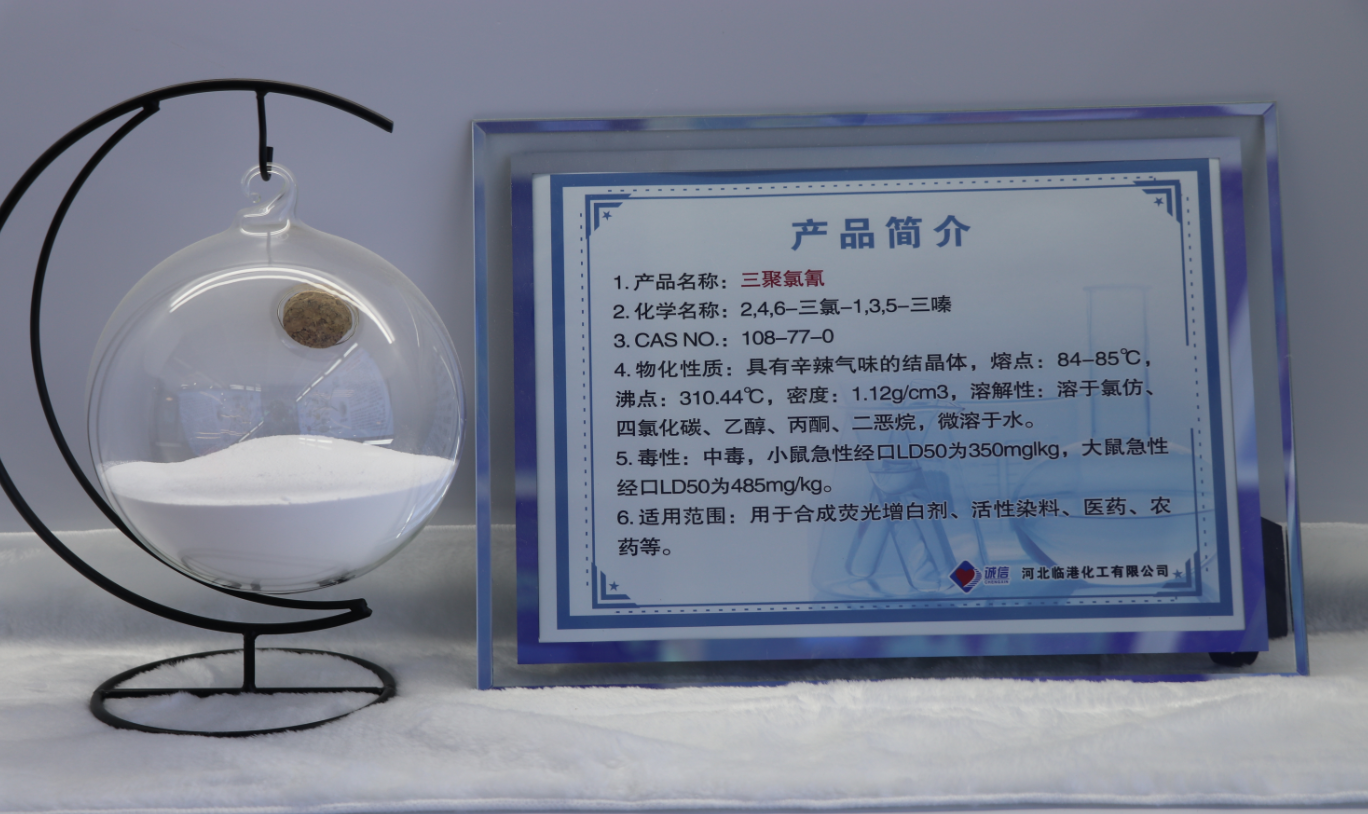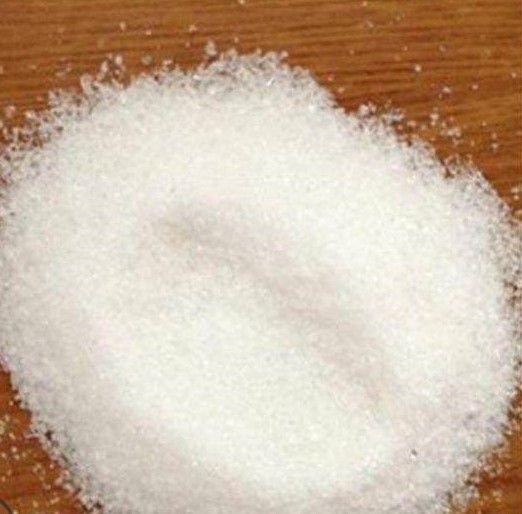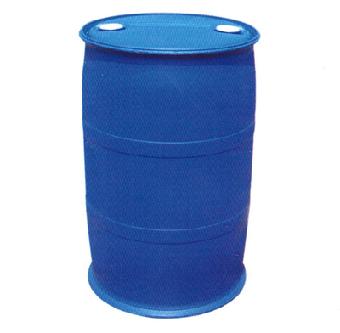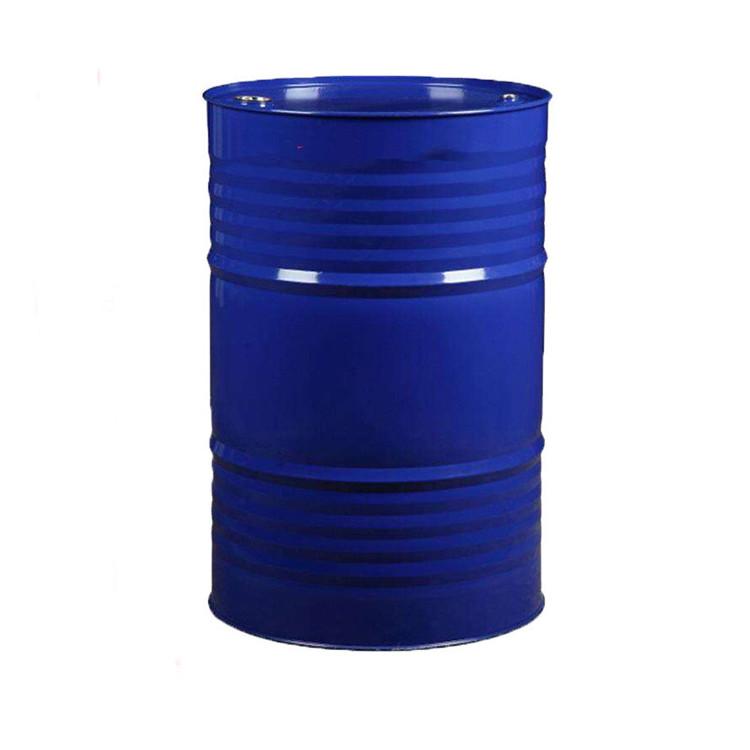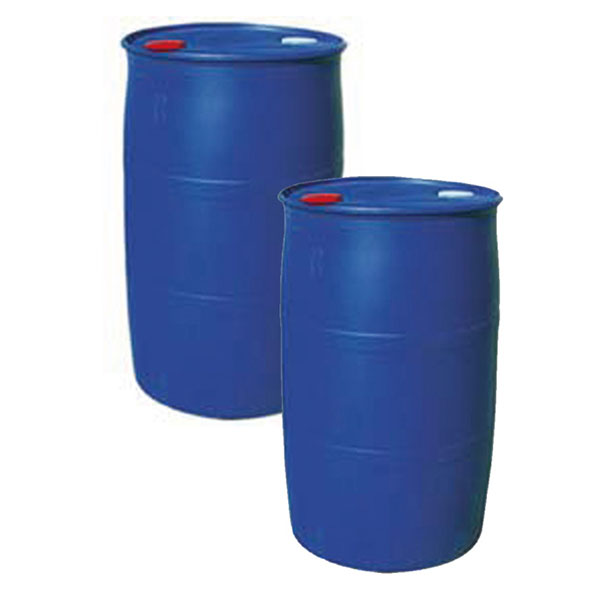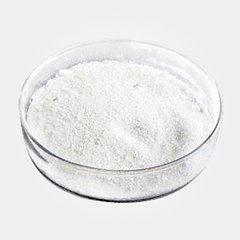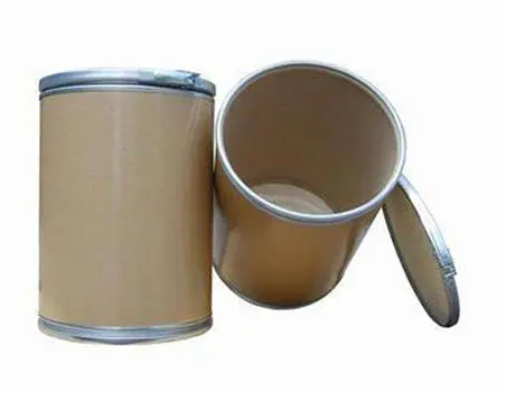Antioxidant
Other Auxiliary Agent
Petroleum Additives
Adsorbent
Water Treatment Chemicals
Rubber Additives
Adhesive Additives
Cross-Linking Agent
Flame Retardants
UV Absorbers
Organic Extractant
Resin Additives
Electronics Chemicals
Pesticide Additives
Building Chemicals
Plastic Additives
Oilfield Chemicals
Adhesive
Plastic Rubber Chemicals
Paper Additives
Molecular Sieve
Coating Additives
Textile Auxiliaries
Fluorescent Brightener
Polyethylene Glycol Derivatives
Coupling
Forest Chemicals
Leather Auxiliary Agents
Beneficiation Agents and Smelting Additives
Dye Auxiliaries
CAS:108-77-0
Molecular Formula:C3Cl3N3
Alias
More Information
Cyanuric Chloride For Synthesis; Cyanurchlorid; 2,4,6-Trichloro-1,3,5-Triazine; 1,3,5-Triazine,2,4,6-Trichloro-; Cyanuric Chloride (2,4,6-Trichloro-1,3,5-Triacine); 2,4,6-Trichloro-S-Triazine; Cyanuricchloride; 2,4,6-Trichloro-[1,3,5]Triazine; 1,3,5-Triazine, 2,4,6-Trichloro-; Cyanuric Chloride in China; Cyanuric
Brief Introduction
Cyanuric chloride is a white crystal with strong irritating chlorine smell, corrosive to skin, irritating and tear inducing to eyes, soluble in anhydrous ethanol, ether, chloroform, acetic acid and acrylonitrile, and insoluble in cold water. Cyanuric chloride is an important intermediate in the production of highly efficient and low toxic triazine herbicides and insecticides, as well as in the production of fluorescent brightener, polyester and other reactive dyes for synthetic fiber dyeing. It is also used in the production of synthetic resin, rubber, polymer antioxidant, explosive, fabric shrinkable agent, surfactant, etc.
Suppliers
View More Vendors (2) >
CAS:111-62-6
Molecular Formula:C20H38O2
Alias
More Information
Ethyloleat; Ethyloleate,Nf; Oleic Acid Ethyl; Ethylis Oleas; 9-Octadecenoic Acid (Z)-, Ethyl Ester; (Z)-9-Octadecenoic Acid Ethyl Ester; 9-Octadecenoicacid(Z)-,Ethylester
Brief Introduction
Ethyl oleate is a fatty acid ester formed by the condensation of oleic acid and ethanol. It is a colorless to light yellow liquid. Ethyl oleate is produced by the body during ethanol intoxication.
Ethyl oleate is used as a solvent for pharmaceutical drug preparations involving lipophilic substances such as steroids. It also finds use as a lubricant and a plasticizer.
Ethyl oleate is regulated as a food additive by the Food and Drug Administration under "Food Additives Permitted for Direct Addition to Food for Human Consumption", 21CFR172.515.
Ethyl oleate has been identified as a primer pheromone in honeybees.
Ethyl oleate is one of the fatty acid ethyl esters (FAEE) that is formed in the body after ingestion of ethanol. There is a growing body of research literature that implicates FAEEs such as ethyl oleate as the toxic mediators of ethanol in the body (pancreas, liver, heart, and brain). Among the speculations is that ethyl oleate may be the toxic mediator of alcohol in fetal alcohol syndrome. The oral ingestion of ethyl oleate has been carefully studied and due to rapid degradation in the digestive tract it appears safe for oral ingestion. Ethyl oleate is not currently approved by the U.S. Food and Drug Administration for any injectable use. However, it is used by compounding pharmacies as a vehicle for intramuscular drug delivery, in some cases to prepare the daily doses of progesterone in support of pregnancy. Studies which document the safe use of ethyl oleate in pregnancy for both the mother and the fetus have never been performed.
Suppliers
View More Vendors (2) >
CAS:112-30-1
Molecular Formula:C10H22O
Alias
More Information
1-Decanol; Decyl Alcohol; Decanol; N-Decyl Alcohol; N-Decanol; Capric Alcohol; Nonylcarbinol; Antak; Caprinic Alcohol; Royaltac; Primary Decyl Alcohol; Alfol 10; N-Decatyl Alcohol; Epal 10; Royaltac M-2; Royaltac-85; Alcohol C-10; C8-10 Alcohols; Sipol L10; 1-Hydroxydecane; Kalcohl 10H; C 10 Alcohol; Decyl, N- Alcohol; Decylic Alcohol; Alcohol C10; Unii-89V4Lx791F; Decanol-(1); Lorol C10; 2-Octylethylether
Brief Introduction
Decyl Alcohol is mainly used to make artificial rose oil, orange blossom and Acacia flavour. It is also used to make lubricant additives, plasticizers, adhesives and so on.
Suppliers
View More Vendors (2) >
CAS:112-52-7
Molecular Formula:C12H25Cl
Alias
More Information
Chlorododecane; Dodeceyl Chloride; Dodecyl Chloride; Dodecane,1-Chloro; N-Dodecyl Chloride; Dodecane, 1-Chloro-; Chloro-1-Dodecane; 1-Chloro-Dodecane; Lauryl Chloride; 1-Chlordodecan; 1-Chlorododecane(Lauryl Chloride)
Brief Introduction
This product is colorless liquid, insoluble in water, soluble in benzene, soluble in ethanol, can be used as surfactant, plasticizer, organic synthesis intermediates.
Suppliers
View More Vendors (2) >
CAS:1135-40-6
Molecular Formula:C9H19NO3S
Alias
More Information
CAPS; N-Cyclohexyl-3-Aminopropanesulfonic Acid; 3-(Cyclohexylamino)Propane-1-Sulfonic Acid; 3-Cyclohexylaminopropanesulfonic Acid; 3-(Cyclohexylamino)-1-Propanesuhinic Acid; N-Cyclohexyl-3-Aminopropanesulfonic Acid (Caps)
Brief Introduction
3-cyclohexylaminopropanesulfonic acid can be used as biological buffer in biochemical diagnostic kit, DNA / RNA extraction kit and PCR diagnostic kit, as well as buffer for enzyme chemistry and HPLC separation of alkaline drugs.
Suppliers
View More Vendors (2) >
Inquiry (
10
/ 10
)
Clear All
Sign In
Error!

